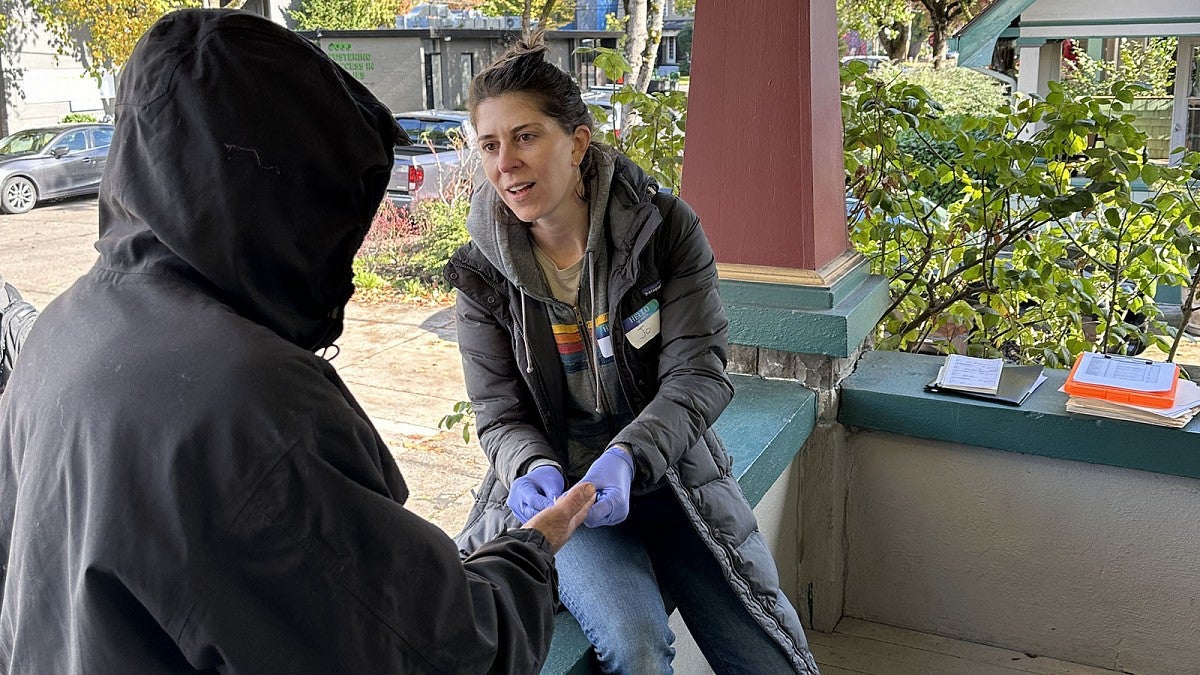As cities of all sizes struggle with rising homelessness, researchers at the University of Oregon are studying the link between stress and long-term health conditions among people without housing and how it drives health inequity.
Led by Jo Weaver, a global studies associate professor in the College of Arts and Sciences, the study is focused on health among people experiencing housing insecurity in Lane County, one of the largest in Oregon. The research team is collecting data from people living on the street, in short-term shelters, in encampments and in more permanent supportive housing arrangements.
The research will explore the health effects of different experiences of homelessness, because not all people experience it the same way. The study is supported by a $359,999 National Science Foundation grant, and the research team includes Department of Anthropology faculty members Zachary DuBois and Josh Snodgrass.
“There hasn’t been a whole lot of work done on stress and health for people who have been unhoused,” said Weaver, who prefers the term houselessness over homelessness. “We know that people who are experiencing houselessness have worse health overall compared to those with stable housing.”
People experiencing homelessness often face increased risk for longer-term health issues, Weaver said, but researchers don’t know much about the details of what leads to specific health issues or contributes to a risk of chronic diseases. Chronic stress is one possible culprit.
Researchers are gathering health and survey data from people experiencing homelessness to understand how stress levels affect their physical health and what is called their allostatic load, or the physiological accumulation of stress that can affect basic functions such as metabolism.
“When people are in a heightened state of stress, digestion is slowed, heart rate and blood pressure change,” Weaver said. “Chronic exposure to stress hormones is effectively like accelerated aging on people, and you can measure correlates of allostatic load by looking at blood and hair.”
While in the field, researchers will use minimally invasive biomarkers to learn where and how stress might be affecting overall health and disease risks and to look for symptoms of potential chronic health conditions.
Lab analyses of hair samples will assess levels of the stress hormone cortisol, and blood samples via simple finger pricks will allow researchers to provide screening information pertinent to diabetes, high cholesterol, iron-deficiency anemia and more. The blood tests are immediately available, so research participants can be informed of their health data and share it with a medical provider.
Along with the biomarkers, researchers are asking participants to fill out surveys about their experiences of homelessness , including what aspects help them cope with the stress of housing insecurity. That allows researchers to learn about the participants’ life stories to better understand long-term experiences and social connections and how those might modify stress.
“People who are living unhoused are remarkably resilient, but we can leverage evidence-based practices and community-defined evidence such as housing first, rapid rehousing and access to hygiene resources like community showers to make it so that they don't have to encounter so much adversity,” said Camille Cioffi, a research assistant professor at the UO’s Prevention Science Institute who has collaborated with Weaver and her team.
The Eugene and Springfield metro area has a population of 239,323. According to the most recent 2023 data from the U.S. Department of Housing and Urban Development, 2,824 people are without homes in the Eugene-Springfield metro area. Of that population, 74 percent are unsheltered.
Researchers are working with local homeless outreach service nonprofits and using a community-based approach where people living with housing insecurity provide advice on the study.
Previous research has focused on unhoused populations in large U.S. cities, such as San Francisco, Los Angeles and Seattle. However, mid- and small-sized cities have not been examined as closely, despite the different challenges that exist in smaller metro areas like Eugene.
“We need to better understand the challenges of houselessness and housing support in smaller communities,” Weaver said. “This is not just an issue that affects big cities. It used to be a big city issue, but I think that landscape has changed in the past five or 10 years in the U.S.”
The study is the first step of what researchers hope will be a longer project. Since acute health issues are common in homeless populations, researchers plan to apply for future funding to understand some of the more important stressors to effectively address health issues.
“Health concerns are one of the things that ends up perpetuating houselessness,” Weaver said. “If we can figure out points where we could intervene and test various ways of intervening, we might ultimately support people’s ability to secure more permanent housing if they should choose to do that, which most people I work with want to do.”
This research is supported by a National Science Foundation Award.
—By Henry Houston, College of Arts and Sciences
—Top photo: Jo Weaver interviews a homeless Eugene man


